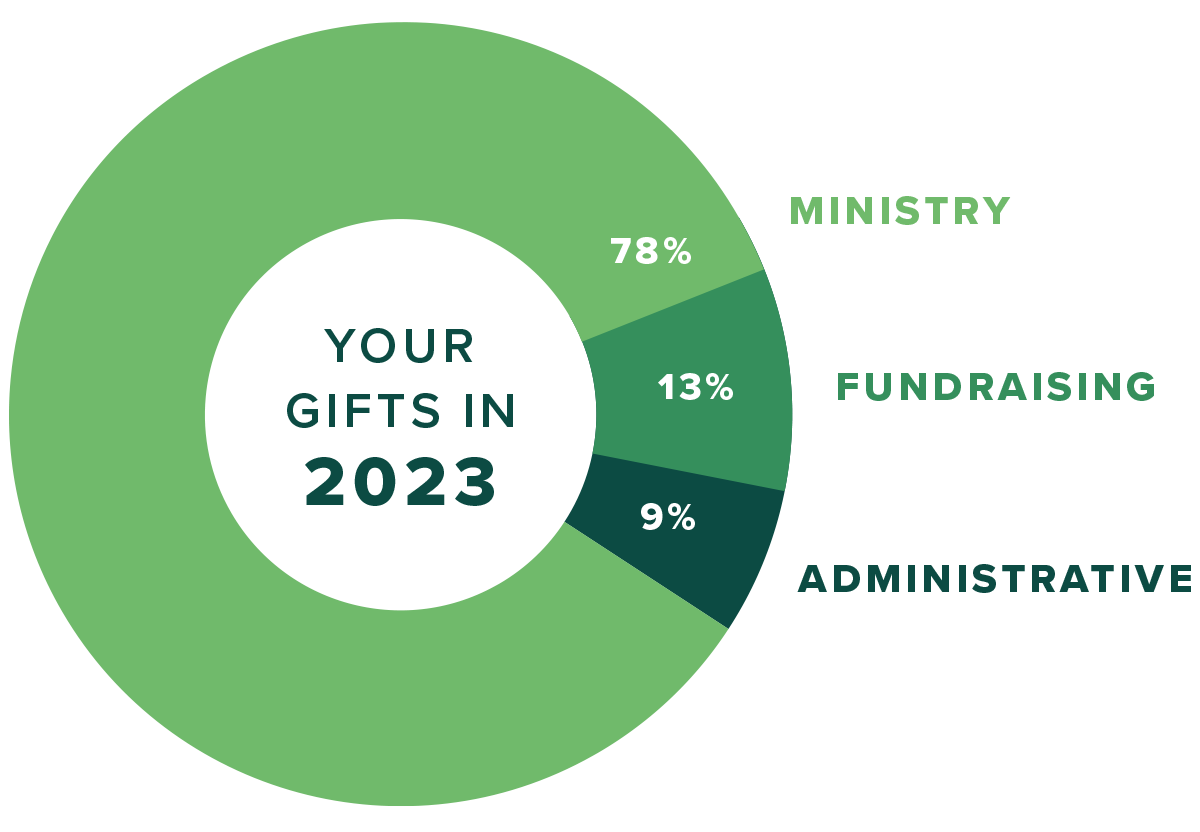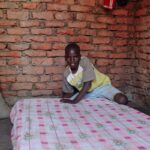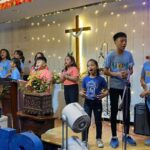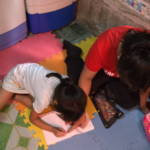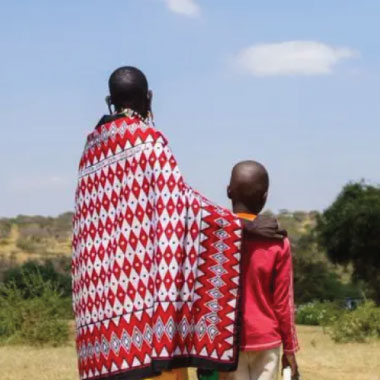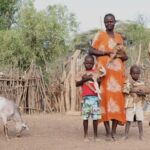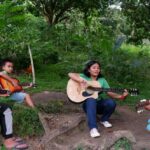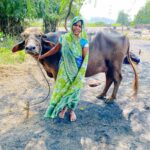A Turkana man who grew up herding cattle gives his heart to God and sees his love for music come to fruition after his son joins a Hope Center. He also comes to realize the importance of education for the potential of kids living in poverty.
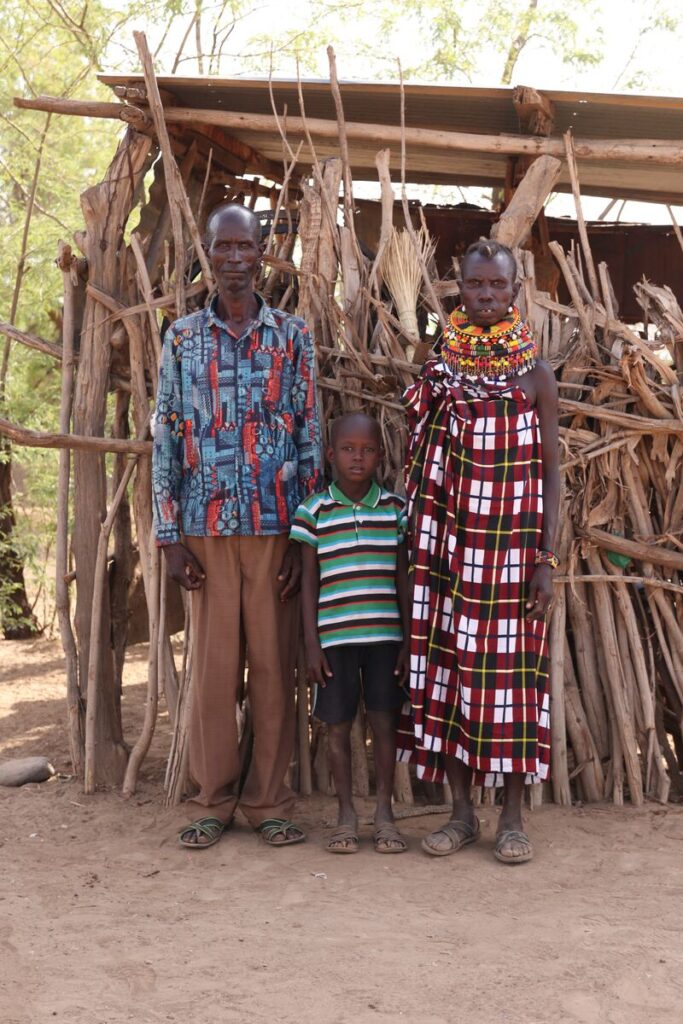
John stands with his wife and son in front of their home.
As a child, John, like most of his peers in Kalapata, became a herder at a young age. Kalapata is a small pastoral village in Turkana, in northwestern Kenya.
John began his journey by joining older herders when they went out. Soon, he was left in charge of baby goats, and eventually he honed his herding skills enough to be in charge of herding all their family’s animals on his own.
Life As a Herder
Of his five siblings, John enjoyed herding the most, and as he grew up his father entrusted him with it.
This meant that he neither had interest in attending school nor the chance to. John’s siblings, however, were able to attend the lower primary levels of education. He says that back then, there was no push for children to attend school.
Herders travel far in search of pasture to graze their livestock. Sometimes they’re away from home for days.
But herders far away from their community face dangers as bandits from neighboring communities try to steal their animals. Men are sometimes killed trying to protect their herd. Over the years, the bandit attacks followed John and his fellow herders to Kalapata, and they lost their animals to them.
Embracing Change
This forced his family to move from Kalapata to Elelea village in the east, where they currently live.
With the loss of their animals, John stopped being a herder and ventured into small-scale farming to help sustain his family. During the planting season, he used irrigation to grow maize, green grams (mung beans), cowpeas, and millet.
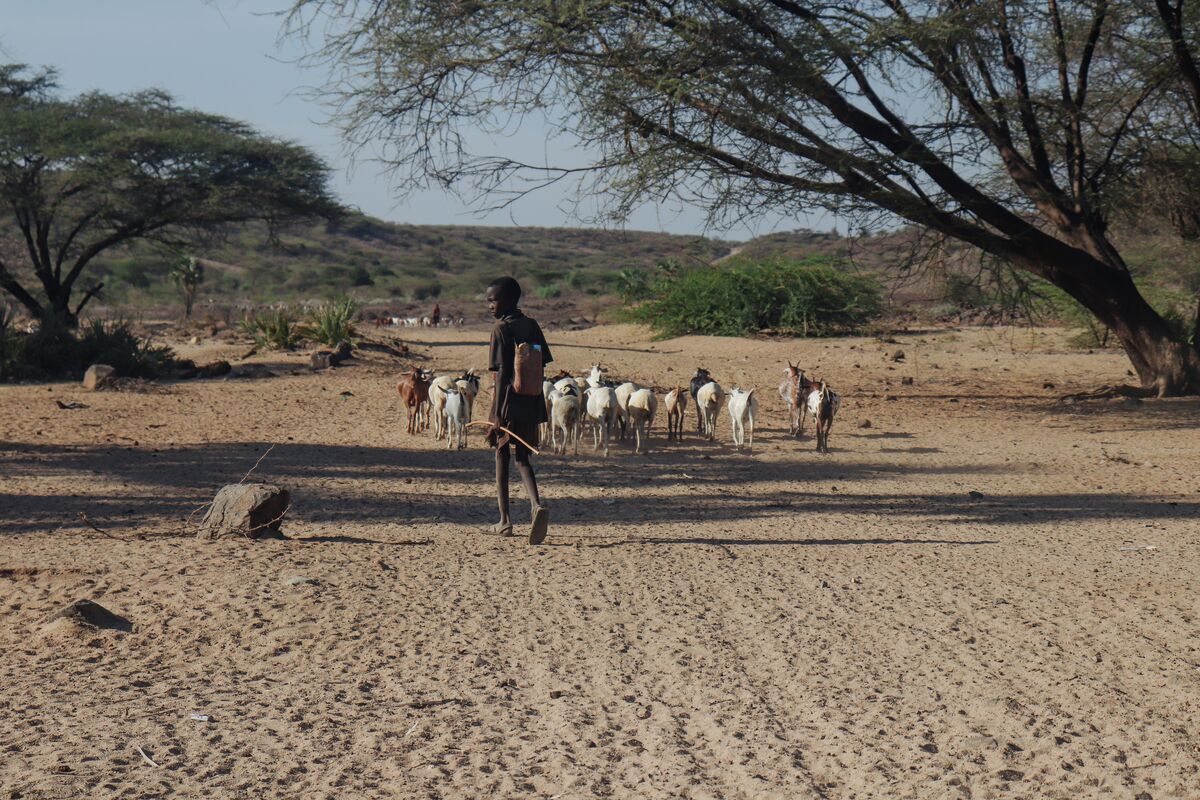
Herders in Turkana often start their job when they are young boys.
During the off-season, John worked mostly as a farmhand for other businesses.
A Wakeup Call
Today, John, 46, lives with his wife and three children in a small mud-walled hut among a few other huts on his homestead. Both his parents and three of his siblings have passed.
John recalls that when they moved to this village years ago, he began to notice something different about the kids there. He realized that children who had received an education often returned home better equipped to help their family members.
This was a wakeup call for him.
“I remember seeing how those kids within my neighborhood had been transformed and were now transforming their families,” John says. “I admired what education had done to them and wished that upon my children.”
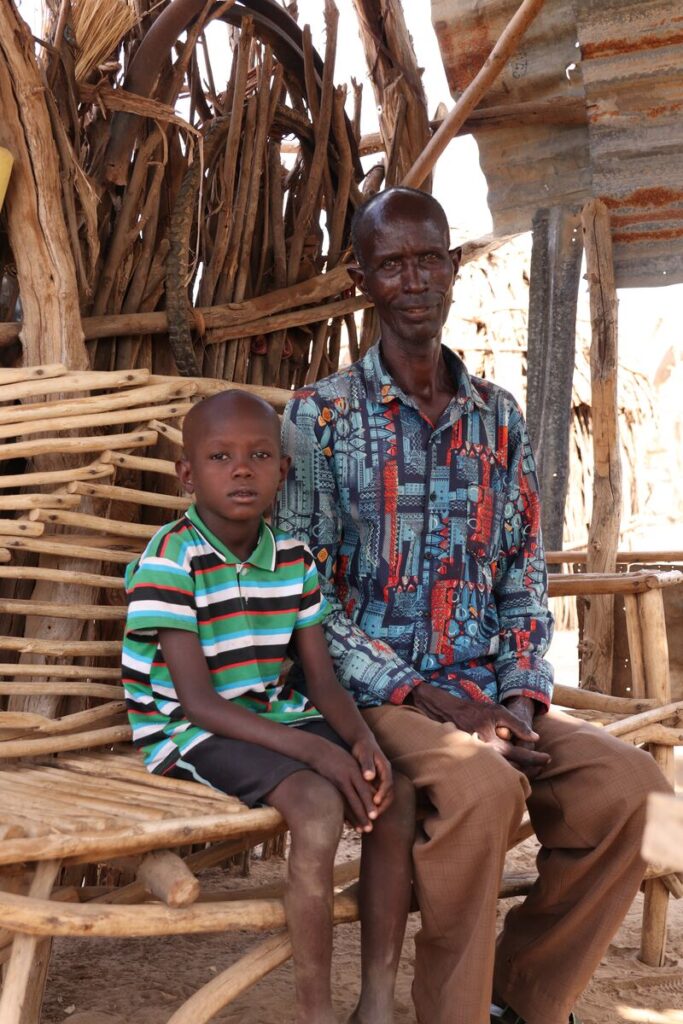
John sits with his son inside their home.
With his mind made up about school, he began taking his eldest child to the school in his village that was less than a mile from home.
Around that time, John heard about a visitor in his community who was helping to build a local church. The guest, a Korean man, the Rev. Park, was well-known in the community for the kind gesture he had made by building the church.
“When Rev. Park was around, he brought with him food and gifts for people in the community, and we also knew that he had fully facilitated the construction of the local church that now still stands a decade later,” he recalls.
Soon after the church was built, John heard about a child development program there called a Hope Center that was registering kids.
“Before I took my son, I didn’t know what to expect of the program, but I knew that I could trust Rev. Park because he had proven to love our community from the day he set foot here,” he says.
John’s second-eldest son qualified to be registered at the OneChild Hope Center there. The program was the first of its kind in their community.
John says the Rev. Park explained to them what the program was about.
“He said that I as the parent would be holding my child’s one hand and the sponsor would hold the child’s other hand, and together, we would walk the journey,” he recalls.
Eventually, his youngest child was also registered at the Hope Center, which held activities every Saturday.
The Turnaround
John recalls his first experience with the program 11 years ago. It was a Sunday, and kids had been asked to attend church service with their parents.
John wasn’t sure about going to church with his son because he had never attended church, other than when he registered his kids.
But on that morning as he sat outside on his ekicholong, a Turkana traditional portable stool carved from a rare species of tree, pondering how the day was going to unfold, he saw well-dressed people heading toward the church.
Out of curiosity, he decided to head over to the church to see what special thing made people dress up and show up.

Turkana is an arid region located in northern Kenya. Photo by Ty Van Rensburg, Child Champion, U.S.A.
At the church, it was a special day because it was a children’s Sunday. During children’s Sunday, kids are given an opportunity to lead the service, usher, read the Bible, and sing. Teenagers are allowed to preach during the service.
“I was moved by what I saw,” John says. “The kids were leading the praise and worship, reading the Bible in Turkana, and it felt magical. I couldn’t believe that the kids were able to do that.”
He was surprised because for a long time, kids in his community were only to be seen and not to be heard. The culture back then didn’t view kids as being important, so no one thought much about them, he says.
But to see the kids lead a service in church opened John’s eyes to their great potential.
“I now understand why it is important for us to attend the children’s Sunday service. Such events allow for the kids to feel seen, heard, and appreciated by the adults in the community,” he says.
After the church service, a crusade had been organized at the market area. During this crusade, John gave his life to Christ.
“After listening to the pastor preach and upon hearing the Bible being read in Turkana, that ministered to my heart, so I went for the crusade to hear about the gospel. And during the crusade, I felt being led to salvation,” he recalls.
John then started attending church. At church, he enjoyed when the choir would perform during the service because he loved music.
Music at Heart
His love for music dates back to when he was a young man when he used to compose and sing songs during traditional community events. One of the main events was when people in the community would select their favorite animal from their herd of cattle, then gather to sing celebratory songs to praise the animals.
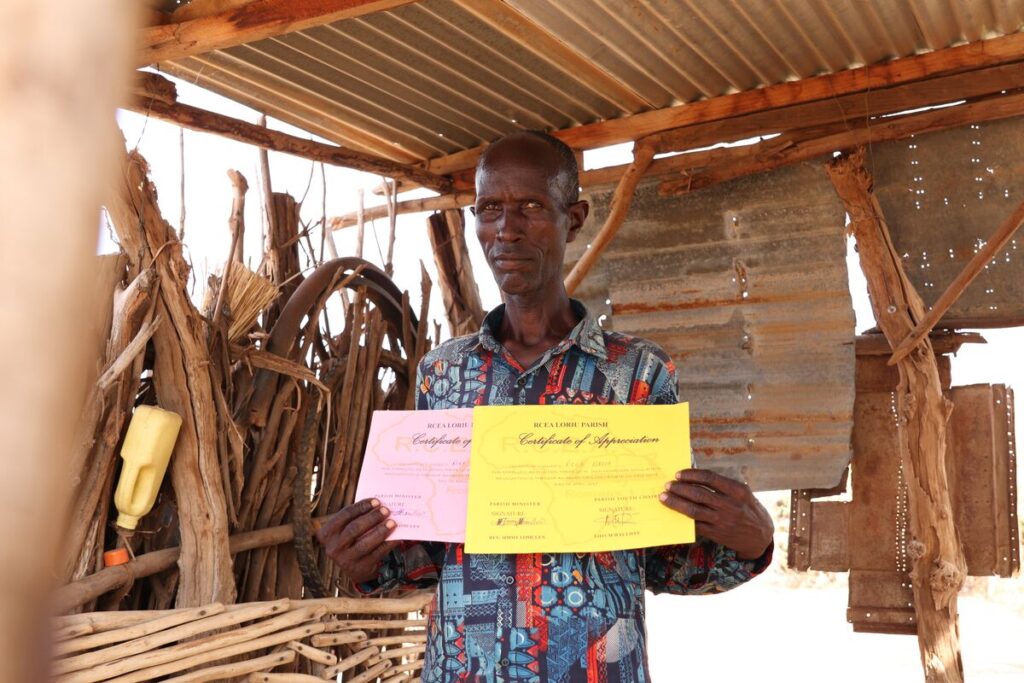
John shows some of the certificates awarded to the music team at his Hope Center from past competitions.
His love for music carried into church, where he would watch the choir practice. While watching, John realized that the choir was struggling.
“They had an amazing music conductor who had gone to school,” John says. “But I realized that some of the choir members were struggling to keep up with the conductor’s pace. They couldn’t pronounce some words well in Swahili and could only speak but not read Turkana, yet they needed to learn the songs.”
He decided to try and find a way to help by composing and teaching music inspired by the Bible. However, he didn’t speak Swahili and couldn’t read or write Turkana. In order to be fluent in both languages so he could teach music, John enrolled in an adult education program offered at the church.
John believed that the choir performance could improve if they had a teacher at their level. He hoped that would help them be more confident when singing.
After finishing his training, an opening for a music conductor came up at church and he gladly volunteered to step in. John formed several choir groups, from the children at the Hope Center, to the youths, to the women and the men. He trained them to mainly sing hymns, some composed by him, and some composed by other people.
With dedication, they were able to put together solid choirs that they could register for competitions. Their church’s denomination organizes a music competition among assemblies annually. John’s church’s choirs have won first place three times in the competitions.
Today, John still volunteers as a music teacher for the kids at the Hope Center, something he says brings him a lot of joy.
“Knowing that I have something to offer to the kids in my community makes me glad. I also enjoy helping them realize the music talent in themselves and seeing them pick it up and thrive at it, blesses my heart,” he says.
Regarding serving in church, John’s encouragement is, “There’s time for everything. But it is important to listen to the voice of God when He calls you, so that you can know when and how to act on that call.
“Serving God gives me fulfilment, knowing that I can impact other people away from my family.”
When you sponsor a child living in poverty, you give them a chance to change their life for the better. Please sponsor a child today!
We are accountable to the children we serve AND to our donors.
Our accountability to our donors is one of our highest priorities. Our goal is to use the funds entrusted to us as wise stewards. To do this requires continued monitoring of our fund distribution. OneChild is also a member in good standing with the Evangelical Council for Financial Accountability (ECFA)
